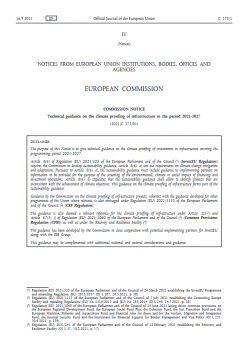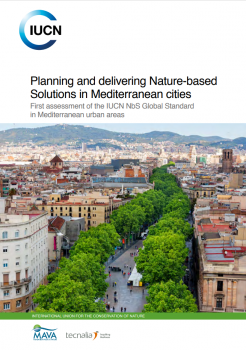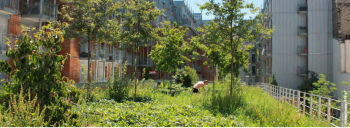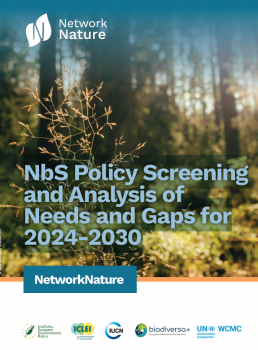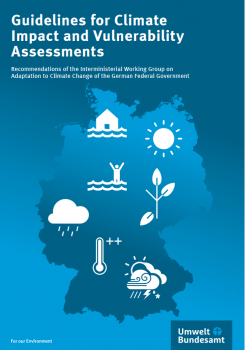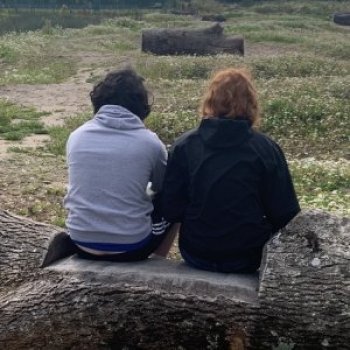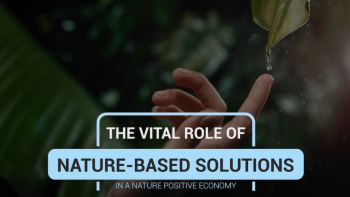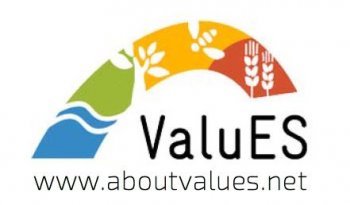Planning and delivering Nature-based Solutions in Mediterranean cities. Summary for policy-makers
This document higlights key findings from the report "Planning and delivering Nature-based Solutions in Mediterranean cities. First assessment of the IUCN NbS Global Standard in Mediterranean urban areas", and should be read in conjunction with the full report. References to research and
Technical guidance on the climate proofing of infrastructure in the period 2021-2027
The new technical guidance on climate-proofing of infrastructure projects has been developed by the Commission in close cooperation with potential implementing partners for InvestEU along with the EIB Group. It is primarily intended for project promoters and experts involved in the preparation
Planning and delivering Nature-based Solutions in Mediterranean cities
This report, published by the IUCN Center for Mediterranean Cooperation, shows the results of an initial assessment of a number of selected projects in Mediterranean cities against the IUCN Global Standard. The projects have been chosen to uniformly represent the climatic peculiarities and
Green Roofs: An Assesment of ecological benefits in the Paris Region
The Paris Region Institute and its biodiversity department ARB (Regional Biodiversity Agency) carried out a three-year study on 36 green roofs. The study, called Grooves (for Green ROOfs Verified Ecosystem Services), ran from 2017 to 2019. The roofs concerned had varied typologies (extensive, semi-
NbS Policy Screening and Analysis of Needs and Gaps for 2024-2030
This report aims at providing an overview of the sustainability policy landscape as well as mapping policy needs and gaps in relation to the deployment of Nature-based Solutions (NbS) in the EU. The NetworkNature platform brings together the NbS community of innovators, practitioners and developers
Guidelines for Climate Impact and Vulnerability Assessments Recommendations of the Interministerial Working Group on Adaptation to Climate Change of the German Federal Government
These guidelines of the Interministerial Working Group on Adaptation to Climate Change of the German Federal Government (IMA Adaptation) provide methodological recommendations for the execution of climate impact and vulnerability assessments at regional and national level. They are intended to
The benefits and risks of rewilding
Rewilding aims to restore healthy ecosystems by creating wild, biodiverse spaces. It rebuilds ecosystems that have previously been modified by human disturbance, using the plant and animal life that would have been present had the disturbance never occurred. In doing so rewilding restores the
Conexus Life-Lab factsheet series - Wetland Lugano, the restoration of an aquatic ecosystem
The Lugano wetland pilot is restoring an aquatic ecosystem lost by urbanization in the south of Buenos Aires. The pilot is led by the city government. It involves key stakeholders to promote social awareness about the benefits that wetlands provide to the community. The enhancement of biodiversity
- Document
Policy needs and opportunities for operationalising the concept of ecosystem services - EU assessment
This report presents the results of an EU policy audit that assesses the current level of integration of ecosystem services and natural capital into the current EU policy framework. It also identifies key gaps, needs and opportunities for further integration, including policy instruments that can
Carbon Sequestration from a Greenhouse Gas Value perspective - Study and online application
Terrestrial ecosystems regulate climate by their exchange of greenhouse gases with the atmosphere. The "Greenhouse Gas Value"(GHGV) is a measure for the greenhouse gas benefit of preserving an ecosystem over a multi-year time frame, or the cost in terms of greenhouse gases when the
Berlin - A thriving city embraces its green spaces (URBES video)
Berlin is one of the greenest cities in Europe, with more than 2,500 public green spaces, parks and gardens. These areas provide a home for natural diversity and a high quality of life for citizens. Over the next 15 years, the German capital is expected to grow by more than a quarter of a million
Greater Manchester Natural Capital User Guide
The User Guide gives an overview with links to the range of natural capital tools available, with step by step instructions on how to use them. Short case studies provide examples of how people have used the tools, and a ‘frequently asked questions’ section helps to address some of the barriers
Interlace Stakeholder Engagement Strategy
Stakeholder engagement is a central element of the INTERLACE project as it aims to co-produce tools, governance instruments and other project deliverables with local stakeholders, as well as facilitate knowledge exchange between local, regional and global stakeholders, to inform and support the
Nature-based solutions for flood mitigation and coastal resilience: Analysis of EU-funded projects
This document summarises outcomes relating to flood mitigation and coastal resilience from the report ‘Nature-based Solutions: State of the Art in EU-funded Projects’ (Wild et al. (Eds.) 2020) prepared through the EC’s Valorisation of NbS Projects Initiative. EU research and innovation projects
Connecting Nature communication, social media & events
In 2017, when Connecting Nature began, the concept of nature-based solutions was in its infancy. Since then, our partners have played an important role in creating and raising awareness about nature-based solutions and about the Connecting Nature Framework as a methodological approach to
Nature-Based Entrepreneurship: City Strategies & Recommendations
Nature-based entrepreneurship is a core element of the Connecting Nature Framework and supports the planning, delivery, and stewardship of large-scale nature-based solutions in cities. As the field of nature-based enterprises (NBE) and entrepreneurship is still novel, the Connecting Nature strategy
The impact of exposure to green or bluespace on dietary intake and food choices among adults—A systematic literature review
Extensive research has shown that spending time in natural greenspaces has a positive impact on health. However, there is limited evidence regarding potential factors that may influence these effects. This review aimed to assess the strength of the evidence and potential impact of exposure to green
The vital role of Nature-based Solutions in a nature positive economy
The Working Group on the Nature-Based Economy of Taskforce 3 produced this short video to highlight the main recommendations of the EC Expert Publication "The Vital Role of Nature-based Solutions in a Nature-Positive Economy". Watch the video and check out the report, which is a first
European Long-Term Ecosystem and Socio-Ecological Research Infrastructure (eLTER H2020)
The overall aim of the eLTER project is to advance the European network of Long-Term Ecosystem Research sites and socio-ecological research platforms to provide highest quality services for multiple use of a distributed research infrastructure.
GIZ ValuES - Method Profile: Different interview formats
Interviews are a key method for obtaining first-hand information and field data on any aspect that is of interest. If well-conducted and properly analysed, interviews can significantly advance understanding of complex issues. Various formats exist: An in-depth interview captures how people value or
- ‹ previous
- 4 of 48
- next ›


